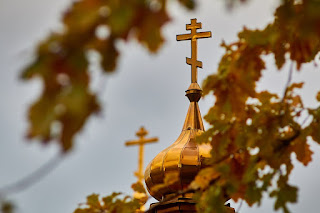What happened in Lithuanian Orthodoxy in 2022?
On the early morning
of February 24th, 2022 the Russian Federation began a full-scale invasion
of Ukraine. Lithuanian society was always anxious about the possibility of
Russian aggression in Lithuanian (because of the memories of being under oppression
of Russian empire and USSR), but the new full-scale war in Ukrainian even
worsened the public opinion towards everything ‘Russian’. Unfortunately, right
now all the parishes of the Orthodox Church in Lithuania belong to the Russian
Orthodox Church (ROC).
The new situation
became a great challenge to the local diocese of the ROC. Metropolitan Innocent
chose silence – he instructed the Lithuanian Orthodox clergy to be totally silent
regarding the war, not to discuss it with the parishioners. If any journalist
would approach a priest or a deacon, he should direct him to metropolitan’s
office. So the first day of the war passed in total silence.
On the second day Fr.
Vitalijus Mockus, chancellor of the diocese, began to publicly condemn the
Russian aggression in Ukraine. He did this with the blessing of the
Metropolitan, but he took a risk – he asked the Metropolitan to allow him to
speak freely, and, he said, if the hierarchs in Moscow object, you can blame and
fire me. The Metropolitan, meanwhile, remained silent.
Under the pressure
from parishioners, Ukrainian relatives and friends who were outraged by the
silence of the Russian Orthodox Church in Lithuania (while patriarch Kirill has
started to support the Russian aggresion), two priests, Fr. Vitalis Dauparas
and Fr. Gintaras Sungaila denounced Patriarch Kirill's support for the war and
Russia's aggression in Ukraine on social media. Their posts were shown to
metropolitan.
In the middle of March,
a meeting of all Lithuanian Orthodox clergy was convened to discuss, among
other things, the idea of stopping commemorating patriarch Kirill as “our great
master and father” (“velikyi gospodin i otec nash”) during the services. This
would not change the Church's dependence on Moscow, but it would be at least a
symbolic act of disagreeing with the Patriarch's position. In fact, during the
meeting it became clear that many of the clergy are “not sure” about the war,
while others were generally in favor of the patriarch’s opinion and the “special
operation”. After nothing had changed, two clergymen – Fr. Vitalis Dauparas and
Fr. Gintaras Sungaila – wrote petitions to the metropolitan, saying that if they
have to commemorate the patriarch, they would rather leave. Fr. Gintaras wrote
very specifically that if the patriarch has to be commemorated, it is against
his conscience.
Immediately after the
meeting, the metropolitan published his address, in which he condemned the war
and said that “his opinion differs from that of the patriarch”. Metropolitan refused
to accept the resignations and offered a compromise to the priests – that they
could stop commemorating the patriarch when they serve in Lithuanian or
Ukrainian. After this public announcement and a private blessing (not to
commemorate the patriarch), metropolitan again returned to silence.
On 14 April, almost a
month after the resignations were declined, a rumor suddenly spread that the
Metropolitan had not only unexpectedly accepted the resignations, but had also
dismissed Fr. Vitalijus Mockas, who had not written any request. Fr. Vitalijus
Mockus was also forbidden to communicate with the media, even to host a
programme on “Radio Maria”. These decisions became official on April 15th.
On the same day, Fr.
Vladimir Seliavka also wrote a letter of resignation in protest against the decisions,
which were a clear punishment for those who publically criticized patriarch’s
support for the war. Soon two more clergymen, Priest Georgy Ananiev and Deacon
Georgy Cyburevkin have also asked do be dismissed because of the same reason. The
group was joined by Deacon Viktoras Miniotas who resigned much earlier
protesting the political nature of patriarch Kirill’s “preaching” and declared that
they intend to ask the Ecumenical Patriarchate to restore its jurisdiction in
Lithuania (it was here before Lithuania was conquered by the Russian empire).
This, of course, had a
broad support in the society. Many laymen have for years fought precisely for
this result. This became even more urgent with arrival of tens of thousands Ukrainian
and Belorussian immigrants. Fearing that this idea might succeed, Moscow
patriarchate started a media-war against the dissident clergy.
On May 10th five of the dissident priests were suspended, one is being defrocked. Two deacons are threatened that they will be suspended too. Ironically, none of the clergymen have left the Moscow patriarchate. None of them celebrated a Liturgy after being dismissed. They literally didn’t do anything, but were charged with being schismatics. They are planning to appeal the decisions to the Ecumenical Patriarchate.




